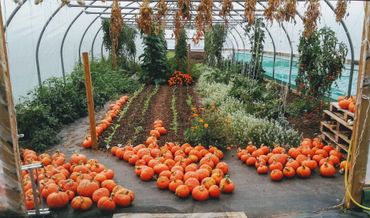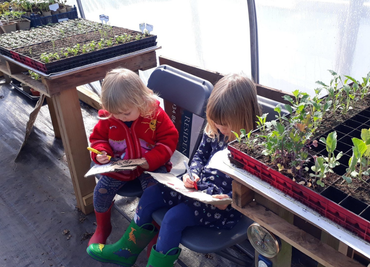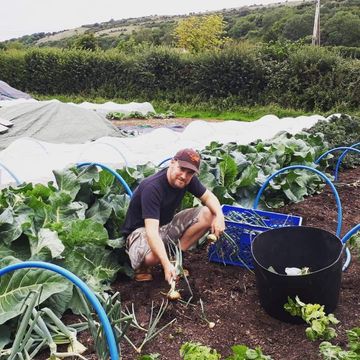Who we are
Two Acre Farm is owned and run by Daniel and Anna, with lots of support from our friends and family. We live nearby and have two young daughters, who love coming to the field and 'helping'!
In addition to our veg bag scheme, we run a market stall at Winscombe Village Market on the third Saturday of each month (9am - 12pm) and occasionally supply wholesale to other local businesses including caterers, festivals and other veg delivery schemes.
We intend to gradually build trust in our farm and encourage short, local food supply chains that are resilient in the face of fuel price rises, international trade issues and climate change, as well as keeping our carbon emissions as low as possible. We use no more than a single 20l jerrycan of fuel for on-farm work for the whole year. A typical large tractor uses this in a day. We deliver veg to customers in an electric van, but we do of course recognise that deliveries to us (compost for example) by other companies typically use fossil fuels for their trucks.
We are a small part of trying to fix a broken food system
We started the farm just before the Covid pandemic and in March 2020
we saw an immediate need and changed our plans for the farm, planting more and different crops and starting a veg delivery scheme to supply local people. In that year, we all saw first hand the weaknesses of a UK food system that relies on supermarkets and long-distance haulage. Under stress, people panic and such a system buckles resulting in empty shelves. It could have been a lot worse.
Then in autumn 2021, we saw similar shortages as well as severe materials and fuel price rises. We have a supply chain that has been incredibly fast and financially
efficient in stable times, when all the parts are working. But this 'just-in-time' capability was traded off against resilience and in the last few years we have seen what happens to such a system when one or two elements break.
In 2022-23, partly as a result of the invasion of Ukraine, food price inflation reached a crazy level of 17.1% according to the ONS. This reveals how dependent our corporate food system is on fossil fuels. Being farmers, we have seen our costs go up significantly, but as we do not rely directly on fossil fuels to power tractors (we don't use one), nor for the production of fertilisers and pesticides (we use neither), we were insulated from much of the increase. We have been able to keep our prices to the lower, overall inflation increase or even slightly below, simply because we are less dependent on these unsustainable systems.
Small farms, short supply chains and direct contact between consumer and producer are more resilient ways to get your food. We just need more of them!
Our farming philosophy - sustainability and resilience
We care about biodiversity above and below ground, and have devoted the lower part of our field to wildflowers, reed and willow in an almost rewilded manner. We feed our soil with cover crops and composted manure from local farms and annually get our soil lab-tested for microbiological activity, soil carbon and mineral balances.
Our first duty is to look after the land. Part of that is being sustainable financially because if we weren't, we wouldn't be here next year to look after it! Some farmers will use this as an argument in favour of using chemicals (i.e. to improve profitability), but we consider that to be short-sighted. Ecological sustainability and resilience are closely tied in that high levels of biodiversity provide a balanced, complex system able to absorb and adapt to shocks like droughts or floods. If we damaged our soils and local biodiversity, we would make our farm less resilient and weaker in the long run. A good example of this is aphid control. We get a few each year and keep an eye on them. The work to counter them has already been done by our leaving the nettles and long grass for the natural predators to have homes. Every year, the aphids appear, then the ladybirds appear and the system is back in balance. The concept of resilience through diversity guides our decisions and has proved effective - it's also less work!
We do not use a tractor, nor chemicals of any kind on our soil or crops. We use agro-ecological, no-till methods, but we are not currently planning on getting Organic certification. There are several reasons for this, but most come down to the fact we are very small and have to use as much of our two acres as we can for growing crops. The certification cost would have to be passed on to our customers. Yes, we could charge a premium for Organic produce, but that is not why we're growers.
We believe we can make a positive impact on our local community and environment without needing to be registered. We prefer to deal direct and encourage our customers to visit the farm to see our farming methods and quality of produce for themselves. Links with our customers and the local community are vital parts of who we are as farmers. If we are your farmers, then you should be able to talk to us face-to-face. And we do with every one of our customers. That is how real trust is built.
We support Organic certification, but are not ourselves certified - here's why
We are a tiny farm, and certification schemes tend to favour larger farms. We are so small that we cannot grow all the compost we need for our farm and still grow food for the local community. Some think this means this means two acres is too small. We look at it differently. Resilience comes not from self-sufficiency and independence, but from joining in community. We see exchanges with local farms as supporting each other and in that way we are all stronger. We are stronger because we rely on each other. That's what community is and aiming for independence from it seems counter-productive. We're fine with buying in some manure and compost from our neighbours. And our neighbours are fine buying in veg.
We believe we are more sustainable, more resilient and have a lower carbon footprint because
we are not registered Organic. Were we to become registered Organic one of three things would happen:
1) We would possibly be forced to plough the soil, releasing large amounts of stored carbon and destroying the biological networks beneath our feet. Our reluctance to do that is based on the rigorous science studying the relationships between mycorrhizal fungi, plants and soil bacteria. It would also mean the expense of buying a tractor and all the fossil fuels burned in using one. We'd rather make do without. It is possible to be Organic without ploughing, but you need to use a significant amount of compost or manure.
2) We would be forced to buy in compost from certified Organic farms at a much greater distance than from our non-Organic neighbours. This would significantly increase our carbon footprint and our costs. Certifying organisations do have derogations to allow farms to use non-organic composts, but then that would just be paying extra to do something we're already doing.
3) We would have to devote so much of our farm to producing compost and green manure crops that our cropping area would have to shrink to a size where we could not supply local people with veg. We would be unsustainable, in short.
It is worth saying that were all farms to use Organic methods, some of these problems would not be there, but we think that is not an argument for certification, it is an argument for charging chemical farms a hefty fee and ensuring they
are the ones that are inspected! Were all farms to use methods that fully respect the soil structure, biology and local biodiversity, there would be no need for certification bodies at all.
But we are not against Organic certification. We need to get to a point where chemicals are the exception, not the rule. For that, we probably do need certification systems to provide trust at a distance. On the occasions we buy-in veg, we buy certified Organic where we do not know the farm, or from a farmer we know and trust using agroecological methods and always as local as possible. Organic certification provides consumers with an indicator of trust - a label they can recognise and this is valuable. We at Two Acre Farm rely on it when we buy in potatoes for example, and we appreciate it. But we also feel that we can better provide that trust for our own customers by talking directly with them, meeting them, asking their views and explaining the complications and trade-offs involved in farming. That is simply superior to a label.
Another good example of a complicated trade off is seed. Although we use chemical-free growing methods, we have chosen to buy some non-Organic seeds in the past over Organic ones where the non-Organic are more local. There are good reasons for this. An organic seed from a distant climate such as Eastern Europe or even China might be labelled 'Organic', but for the Organic label you would be trading off local adaptations that a non-organic seed might have if grown in an environment that is a closer fit to our own. The ideal of course, is to use UK seed companies, preferably small Organic or agroecological ones in the South West, and so the bulk of our seed comes from Tamar Organics, Real Seeds, Vital Seeds and Winnow Farm Seeds but we like to be flexible, so we can be more resilient. We will never use nasty chemical sprays on our crops. But we may occasionally buy non-Organic seed. We hope you see why. Even better is growing our own seed, which we do as much as possible.
Food and commodification
In our opinion, the biggest problem in farming and food production is the corporate dominance of it. The second, connected problem, is probably access to land for those who want to challenge that dominance. Farmers are forced by large buyers (supermarkets and agribusinesses) to chase yields and are pushed towards monoculture and the chemical degradation of land. The commodification of a food (wheat, corn, rice, meat and even vegetables to an extent) is the driving force behind the separation of consumer from grower - a thing most people now lament. It's part of the reason you probably don't know a farmer personally, even if you live outside of a city. The pride of the grower is diverted from quality to quantity by commodification. Land, too is commodified by corporate investment, pricing out the people who actually want to grow quality food for you. We support The Landworker's Alliance as they campaign against these structures and for better systems of land ownership and access.
De-commodifying food (and other things) is a tough thing to do, but focusing on local, independent producers and not buying from corporations is one way. We believe meeting and getting to know the people who you buy from is part of it too. It becomes based on personal trust rather than trust in institutions and corporations.
We hope that one day there can be thousands of small farms serving local markets rather than huge corporations that simply treat seed and food as commodities. The fact that wheat is one of the most traded foods on the commodity markets is a misrepresentation and a terrible shame. Wheat is wonderfully diverse and has been bred in tens of thousands of different ways to respond to different local environments and to be resilient to various shocks. To lump them together is ignorant and based on strategies of power and greed, not on feeding people efficiently. Food price surges caused by market speculation are an international disgrace that cause entirely avoidable hunger.
We are a small, family-run farm with no intention of growing beyond our local market. We focus on knowing our customers, growing truly flavourful crops, freshness and developing locally adapted crops with diverse genetics - sometimes called 'landrace' crops; all things that agricorps and supermarkets cannot match. We
will never be able to replace the vast food system that has developed in the last 70 or 80 years. But climate science gives us clear indications that huge changes are heading our way. When they accumulate, we hope there are thousands more resilient, adaptable small farms that people can trust to provide their food.




